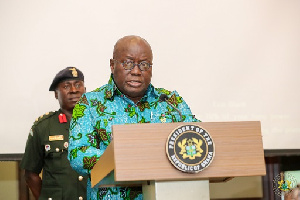 President Nana Addo Dankwa Akufo-Addo
President Nana Addo Dankwa Akufo-Addo
Education indeed plays a pivotal role in the development of a nation. Thus the proactive approach to improving accessibility and quality is not through political gimmicks and insobrieties, but through well-thought through policies such as the Akufo-Addo’s free SHS.
It is also judicious and pragmatic for any authority to attempt to bridge social inequalities through rational distribution of national resources (Li, Savage , Ward 2008).
The newly implemented poverty reduction free SHS should at least open up avenues for students, individually and collectively, to develop to their full potential and to have a reasonable chance of leading productive and creative lives that they value.
The fact however is, despite the endless attacks and criticisms, the free SHS policy will bring enormous benefits to the students, parents and the nation as a whole.
Take, for instance, a pessimist like my maternal uncle, Oliver, is likely to reap tremendous benefits in the long run despite his needless and never ending pessimism.
For example, by 2019/2020 academic year, my uncle should have three of his children in Senior High School for free.
And if we were to calculate my uncle’s total savings as a result of the free SHS, he is likely to save not less than GH9000 per year.
So, what is the relevance in debating endlessly over the taxonomic classification (nomenclature) of the otherwise expedient policy like free SHS?
In my humble opinion, the assigned name of the free SHS policy is not relevant; whether we call it progressively free or totally free. However, what matters most is the apparent massive benefits that can be realised from the seemingly advantageous policy.
As a matter of fact, the poverty alleviation free SHS policy reinforces the United Nations vision on human development and the right to development.
Indeed, as the international community heads toward implementing and monitoring the 2030 Sustainable Development Goals agenda, the human development approach remains useful to articulating the objectives of development and improving people’s well-being by ensuring an equitable, sustainable and stable world.
In hindsight, human development – or the human development approach- is about expanding the richness of human life. It is an approach that is focused on people and their opportunities and choices.
In reality, human development focuses on improving the lives of people rather than assuming that economic growth will lead, automatically, to greater wellbeing for all.
In other words, human development is about giving people more freedom to live lives they value. In effect, this implies developing people’s abilities and giving them a chance to improve upon their lives.
It is also worthy of note that the United Nations Declaration on the Right to Development unequivocally acknowledges development as a right and puts people at the centre of the development process.
This is exactly what the free SHS policy is seeking to do. It is anticipated that the policy will at least create a sound environment for the students.
And more so the Declaration on the Right to Development clearly states: “development is a comprehensive process with a view to improving “the well-being of the entire population and of all individuals on the basis of their active, free and meaningful participation in development and in the fair distribution” of the resulting benefits.”
Whereas Article 55 of the United Nations Charter addresses the need to promote higher standards of living, full employment, and conditions of economic and social progress and development, with a view to fostering stability and well-being (UN 1945).
But all said and done, in as much as developing people’s abilities and giving them a chance to improve upon their lives is necessary, it will be no good if important steps are not taken to advance their aspirations.
Let us therefore face it, it is not just the matter of the children passing through the education system that will bring about their social mobility, but it is rather by providing them with positive outcomes (Bridge 2016).
Take, for example, educating a large number of children would build their skills, but it will be little, or no use if they are denied access to jobs, or do not have the right skills for the local labour market.
In Ghana today, it is pretty normal for many young people to come out of higher institutions without superlative employable skills that can improve their chances of securing a desirable employment that will help them realise their potential and enter the social mobility pipeline.
Disappointingly, however, we have arrived at this unfortunate situation because the successive governments failed miserably to provide the necessities for quality education.
In sum, human development is, basically, about more choices. It is about providing people with opportunities like Akufo-Addo’s poverty reduction free SHS.
